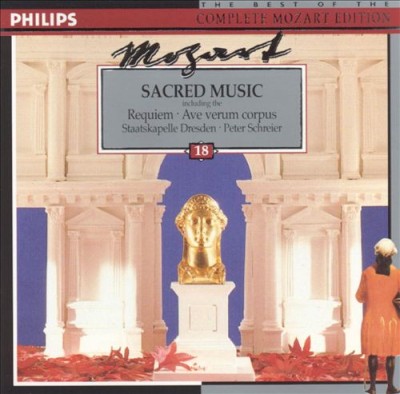Mezzo-Soprano: Trudeliese Schmidt
Tenor: Francisco Araiza
Bass-Baritone: Theo Adam
Choir: Leipzig Radio Chorus
Orchestra: Staatskapelle Dresden
Conductor: Peter Schreier
Date: March 1982
Venue: Leipzig
Cat No.: 446 240-2
Released: 1995
The fact that he knows the score inside out and that he loves the music passionately, shines through the whole performance: I can think of few, if any, live or on records, that have struck me as being so totally committed to the spirit of this great work, or have made it sound like a finished masterpiece—despite the fact that Mozart did not live long enough to write the score out in full, and that it was completed by his pupil Sussmayr. He is, as every singer should be, especially sensitive to the words, as well as to the music: one instance is his quite extraordinarily perceptive handling of the Recordare, in which the four soloists for once sing as if they really understand every word and inflection of the Latin text. The solo quartet is unusually fine and well balanced, and if I say that Margaret Price sings the prominent soprano part better than I can ever remember having heard it sung, this is in no way meant to disparage the equally beautiful singing of Trudeliese Schmidt, Francisco Araiza and Theo Adam. The Leipzig Radio Chorus and the Dresden State Orchestra provide splendid support and Philips’s digital recording is uncannily vivid.
There is no shortage of recordings to compare this new one with. Of the two listed above, Barenboim’s on HMV is the more dramatic, Marriner’s (Argo) the more restrained. Both have their good points, and both have first-rate soloists, chorus and orchestra (Barenboim has Sheila Armstrong, Dame Janet Baker, Nicolai Gedda, Dietrich Fischer-Dieskau, the John Alldis Choir and the ECO; Marriner has Ileana Cotrubas, Helen Watts, Robert Tear, John Shirley-Quirk and the ASMF Chorus and ASMF). But, for me, Schreier’s performance is a revelation, and his recording is the one that I would take to my desert island if I had the choice.
— Robin Golding, Gramophone [March 1984], Review of the Vinyl edition
Different singers are heard in the Mass; Edith Mathis is a delight, and Hans Peter Blochwitz is an accomplished tenor, but neither Jadwiga Rappé (contralto) or Thomas Quasthoff is in the same league. Still, for anyone seeking an outstanding account of the Requiem, this is an obvious choice, and Schreier’s version has few ideal rivals at mid-price. Philips’ remastering sounds very impressive indeed.
— Classics Today [June 24, 2001]
